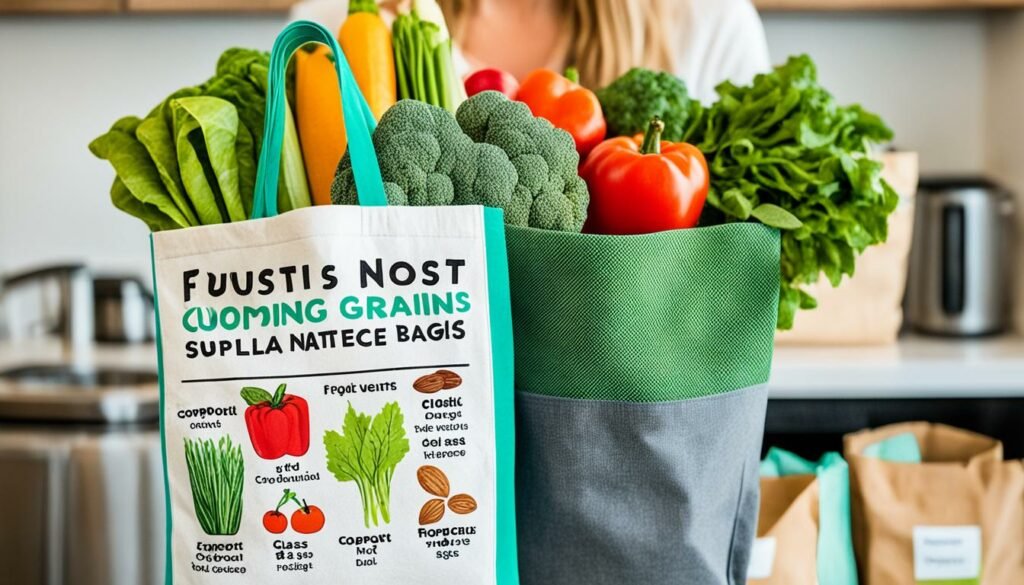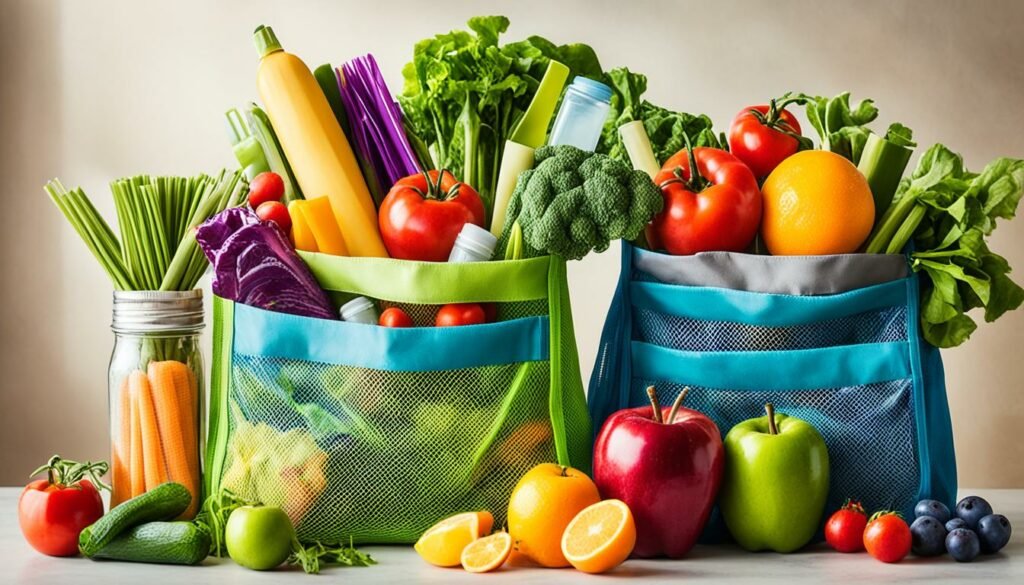Did you know the average American generates about 4.9 pounds of waste daily? This alarming figure underscores the critical need for altering our shopping habits. Embracing a zero waste lifestyle is not just possible; it’s profoundly fulfilling. This guide is packed with eco-friendly tips aimed at assisting anyone, including you, in cutting down waste in your daily shopping.
By adopting practical strategies to reduce plastic and overall waste, I aim to equip you for a sustainable living path. Every minor change, from using reusable bags to meal planning, plays a crucial role in environmental protection. Let’s explore straightforward methods that can significantly alter our shopping and living habits for the better.
Understanding the Zero Waste Movement
The zero waste movement is a powerful initiative aimed at decreasing daily waste generation. It’s essential to grasp what zero waste entails for those seeking a greener lifestyle. This movement advocates for a transition from managing waste to reducing it, urging us to reassess our consumption patterns. By making thoughtful choices, we can significantly cut down on waste and live more sustainably.
What Zero Waste Means
Zero waste transcends simple recycling or reusing. It’s about a comprehensive approach to consumption, urging us to prevent waste at its source. This means scrutinizing the products we buy, their packaging, and their eventual disposal. Adopting this perspective profoundly changes how I evaluate my everyday purchases.
The Benefits of Going Zero Waste
Embracing zero waste offers numerous advantages. It lowers our carbon footprint and helps save money by cutting down on unnecessary buys. A zero waste lifestyle enhances our environmental connection and boosts mental health through mindful consumption. This approach instills mindfulness in our daily decisions, benefiting the planet.
Planning for Zero Waste Shopping
Proper planning is key to a successful zero waste shopping experience. By focusing on meal planning, I can make choices that are good for my budget and the planet. A sustainable shopping list is vital for cutting down on waste and ensuring I use every purchase wisely.
The Importance of Meal Planning
Effective meal planning is essential for zero waste shopping. It helps me pinpoint the ingredients I need for the week’s meals. This approach reduces food waste and encourages mindful buying habits. Knowing exactly what I require prevents impulse purchases and minimizes excess.
This method ensures I use all ingredients efficiently, which helps in reducing waste and keeping costs in check.
Creating a Sustainable Shopping List
Following meal planning, I craft a sustainable shopping list for my weekly meals. This list ensures I buy only what I need, preventing unnecessary waste. It helps me reflect on my consumption and align it with my zero waste goals.
I categorize my list into perishables and non-perishables, maintaining a balance for my meal prep. This approach allows me to make informed choices about where to shop, favoring local stores and bulk bins when possible.

Embracing Reusable Items
Adopting a zero-waste lifestyle begins with using reusable items. By making sustainable choices daily, I significantly cut down on waste and enjoy practical benefits.
Choosing Reusable Bags
Switching to reusable bags for shopping is a simple yet effective step. These bags not only reduce plastic waste but also offer durability and style. I always have a few reusable bags handy, ensuring I’m ready for any shopping trip. Investing in quality bags means I support sustainability and enjoy long-term benefits.
Investing in Reusable Utensils and Containers
Choosing reusable utensils and containers is key to my zero-waste lifestyle. Many brands offer stylish and practical options that promote sustainability. With my reusable utensils, I avoid single-use plastics during meals out or picnics. For bulk purchases, I use containers that help me store food efficiently, reducing waste and promoting a healthier lifestyle. For more information on eco-friendly alternatives and how to incorporate them, visit this beginner’s guide.

| Item | Benefits | Eco-Friendly Alternatives |
|---|---|---|
| Reusable Bags | Reduces plastic waste, durable | Fabric or recycled materials |
| Reusable Utensils | Eliminates single-use plastics | Bamboo or stainless steel options |
| Reusable Containers | Convenient for bulk buying | Glass or silicone alternatives |
Buying in Bulk: A Savvy Choice
Buying in bulk has revolutionized my shopping habits, offering both economic benefits and a way to cut down on packaging waste. I frequently visit bulk food stores to stock up on groceries, bringing my own containers along. This approach minimizes the use of plastic packaging and fills my pantry with necessary items.
The Advantages of Bulk Food Stores
Opting for bulk food stores allows me to choose the quantity I need while supporting sustainable practices. The key benefits include:
- Lower prices per unit
- Fresh and high-quality products
- Variety of food options, including organic and specialty items
- Reduced plastic waste
By choosing bulk purchases, I help the environment and enjoy better deals.
How to Properly Store Bulk Purchases
After making bulk purchases, proper storage is crucial to keep items fresh and minimize waste. I use airtight containers for grains, nuts, and dried fruits, which significantly extends their shelf life. Here are some tips for effective storage:
- Keep bulk items in cool, dark places to prevent degradation.
- Label each container with the purchase date for easy tracking.
- Use clear containers so I can see what I have at a glance.
For more tips on zero waste practices, check out this helpful resource. It has inspired my journey towards a more sustainable lifestyle.
Eco-Friendly Alternatives to Everyday Products
Adopting eco-friendly alternatives in my daily routine is a pivotal step towards a zero waste lifestyle. Swapping single-use items for sustainable options not only cuts down on waste but also boosts my health.
Swapping Out Single-Use Items
Many single-use items, such as plastic cutlery, contribute to plastic pollution. It’s crucial to find better alternatives. Switching to durable utensils is a simple change. I prefer using stainless steel or bamboo straws over plastic ones, which often end up in landfills. Instead of cling film, I use beeswax wraps for wrapping food, which is better for the environment.
Finding Plastic-Free Products
Searching for plastic-free products has been a fulfilling experience. I’ve found numerous options in eco-friendly stores and online. My dedication to sustainable living pushes me to seek these alternatives, which help me and the planet. By choosing eco-friendly alternatives, I support conscious consumerism and a sustainable lifestyle.
| Single-Use Item | Eco-Friendly Alternative |
|---|---|
| Plastic Straws | Stainless Steel or Bamboo Straws |
| Plastic Wrap | Beeswax Wraps |
| Disposable Cutlery | Reusable Utensils |
| Plastic Bags | Reusable Tote Bags |
| Paper Towels | Cloth Towels |
Small steps towards eliminating single-use items allow me to enjoy eco-friendly alternatives and make a positive environmental impact. For more tips on zero waste living, I suggest looking at this guide.
Zero Waste Shopping Beginner’s Guide: Practical Tips
Embracing a zero waste lifestyle has turned into a thrilling journey for me. It involves delving into refillable options and compostable products. I’m committed to selecting sustainable choices that significantly reduce my environmental footprint. This guide will unveil the practical tips I’ve discovered during my journey.
Refillable and Compostable Options
In my shopping endeavors, I always seek out refillable options to effectively reduce waste. Many establishments now offer refill stations for products like shampoos, detergents, and cleaning solutions. This approach not only diminishes plastic consumption but also bolsters local businesses and my financial planning. Additionally, incorporating compostable products into my shopping list has made a substantial impact on my eco-friendly lifestyle. These items decompose naturally, enhancing soil quality and averting landfill buildup.
Making the Most of Thrift Stores and Exchanges
Thrift stores have become essential for me. They serve as a haven for second-hand clothing, household items, and more. By frequenting these stores, I’m able to acquire affordable items while significantly reducing waste. Clothing exchanges present another excellent avenue to update my wardrobe sans contributing to the fast fashion dilemma. These practices not only foster sustainable consumption but also nurture a community ethos and inventive resourcefulness.
| Refillable Options | Compostable Products | Thrift Stores |
|---|---|---|
| Soaps and Detergents | Biodegradable Trash Bags | Clothing and Accessories |
| Shampoo and Conditioner | Compostable Cutlery | Household Items |
| Body Lotion and Oils | Paper Plates and Cups | Books and Media |
Conclusion
Embracing a zero waste lifestyle is more than a personal choice; it’s a step towards a healthier planet. This guide has detailed the basics of eco-friendly shopping and the steps for sustainable choices. From planning meals to buying reusable items, every action I take has a positive impact.
At first, the idea of going zero waste might seem daunting. Yet, I’ve found that changing my habits is a rewarding journey. By making these changes part of my daily life, I’m part of a bigger story of environmental responsibility. Every effort, big or small, helps me make a difference.
Let’s embark on this eco-friendly path together. As I move forward, I’m inspired by the potential of sustainable choices. By shopping mindfully and cutting down on waste, I’m contributing to a better future for future generations.
FAQ
What is the first step I should take towards zero waste shopping?
Beginning with reusable bags is a simple yet effective way to cut down on plastic. I keep them in my vehicle or purse. This way, I always have them ready for my next shopping trip.
How can meal planning contribute to a zero waste lifestyle?
Planning meals aids in crafting a sustainable shopping list. It helps me avoid impulse purchases and buy only what I truly need. This approach significantly reduces food waste.
Where can I find bulk food stores?
Bulk sections are available at many local grocery stores. I can also search online for bulk food stores in my area. These stores encourage me to bring my own containers, thereby decreasing packaging waste.
What are some eco-friendly alternatives to single-use products?
I’ve switched to using stainless steel or bamboo straws instead of plastic ones. For wrapping food, I’ve moved away from cling film and now use beeswax wraps. These alternatives are more environmentally friendly and often last longer.
How can I store bulk purchases to maximize freshness?
For storing bulk items like grains, nuts, and dried fruits, airtight containers are crucial. They help maintain freshness and prevent spoilage, ensuring my purchases remain usable for a longer period.
Are there any thrifting tips for zero waste shopping?
Thrift stores and clothing exchanges are my go-to places for second-hand items. They offer a cost-effective way to shop while supporting sustainable practices. By giving pre-loved items a new life, I contribute to a greener future.
What should I look for when choosing eco-friendly products?
When searching for plastic-free products, I focus on items crafted from sustainable materials. I also prefer products that offer refillable or compostable options. These choices help minimize waste further.
How does conscious consumerism fit into zero waste shopping?
Making thoughtful purchasing decisions significantly reduces my environmental footprint. Conscious consumerism encourages me to support brands that prioritize sustainability and ethical practices. This approach helps me make a positive impact on the planet.


